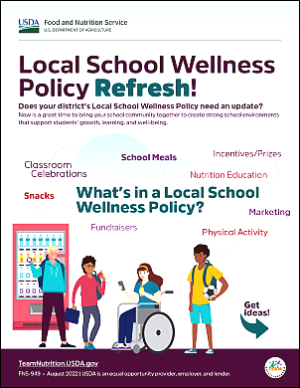Use these local school wellness policy tools and resources to bring your school community together to create strong school environments that support students’ growth, learning, and well-being.

|

|
Triennial Assessment Resources
Every local educational agency (LEA) participating in the National School Lunch Program (NSLP) and School Breakfast Program (SBP) must conduct an assessment of their wellness policy every three years, at a minimum. Find more information and resources at the websites below:
- Local School Wellness Policy: Administrative Review Process
- Local Process: How to Develop, Implement, and Evaluate a Wellness Policy
- Local School Wellness Policy Triennial Assessment Waiver
- School Health Index (SHI), developed by the Centers for Disease Control and Prevention (CDC), is a self-assessment and planning guide that can enable schools to identify strengths and weaknesses of health and safety policies and programs. It also enables schools to develop an action plan for improving student health, and to engage teachers, parents, students, and the community in promoting health-enhancing behaviors and better health.
- The Wellness Policy in Action Tool (WPAT), developed by the CDC and the UCONN Rudd Center for Food Policy and Health, is an online tool to help districts and schools examine the alignment of district wellness policies and school-level practices for nutrition and physical activity. The WPAT, designed to help schools meet triennial assessment requirements, addresses 31 key topics using questions from the WellSAT 3.0 and the School Health Index. The WPAT provides scores and actionable recommendations to help users continually improve school wellness policies and practices.
- Resource to Sustain and Strengthen Local Wellness Initiatives is a guide to help school districts conduct an evaluation of local wellness policies. This guide details step-by-step instructions for conducting an evaluation, deciding what the results mean, and communicating the findings to stakeholders (developed by Institute of Child Nutrition and funded, in part, by USDA).
Model Wellness Policies
- Model Local School Wellness Policy, developed by the Alliance for a Healthier Generation, was reviewed by FNS, and is compliant with the statutory requirements for local school wellness policies, as per the final regulation, “Local School Wellness Policy Implementation Under the Healthy, Hunger-Free Kids Act of 2010.” This model wellness policy can be used by local educational agencies to help create their local school wellness policy and meet the minimum federal standards for local school wellness policy implementation.
- WellSAT 3.0, developed by the UCONN Rudd Center for Food Policy and Health, is a wellness policy scoring tool to help you compare your written local school wellness policy to a model policy. It provides a quantitative score that identifies areas of excellence and opportunities to strengthen your written policy.
- The Institute of Child Nutrition’s Child Nutrition Sharing Site provides additional model wellness policies.
Wellness Committee Resources
- Team Nutrition’s Local School Wellness Policy Outreach Toolkit provides ready-to-go communication tools to engage school staff and parents in school wellness.
- Alliance for a Healthier Generation’s School Wellness Committee Toolkit is a resource for school wellness committees to convene, plan, and implement their action plans.
- Parents for Healthy Schools is a CDC resource to assist schools, school groups, and school wellness committees with encouraging parent involvement in school health.
Additional Resources
- Team Nutrition’s Local School Wellness Policy page includes helpful links, background information, and an overview of requirements.
- Team Nutrition's Resources for Schools include training for school food service, nutrition education for children and families, and resources to support a healthier school environment.
- The Local School Wellness page on the ICN's Child Nutrition Sharing Site provides a variety of resources to assist school districts with wellness policy implementation, triennial assessments, nutrition education, and wellness activities.
- The CDC has online resources to assist school districts in designing, implementing, and promoting elements of local school wellness policies:

